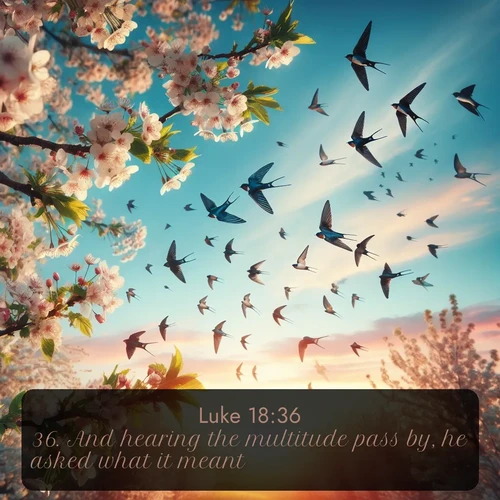Gospel of Luke 18:36 plusieurs versions / traductions
English Bible Translations
36. And hearing the sound of a great number of people going by, he said, What is this?
German Bible Translations
36. Und da er das Volk vorüberziehen hörte, erkundigte er sich, was das sei.
French Bible Translations
Versions with Strong Codes
Luke 18 / KJV_Strong36. And[G1161] hearing[G191] the multitude[G3793] pass by,[G1279] he asked[G4441] what[G5101] it[G5124] meant.[G1498]
Strong Code definitions
G1161 de/deh a primary particle (adversative or continuative); but, and, etc.:--also, and, but, moreover, now (often unexpressed in English).
G191 akouo/ak-oo'-o a primary verb; to hear (in various senses):--give (in the) audience (of), come (to the ears), (shall) hear(-er, -ken), be noised, be reported, understand.
G3793 ochlos/okh'los from a derivative of G2192 (meaning a vehicle); a throng (as borne along); by implication, the rabble; by extension, a class of people; figuratively, a riot:--company, multitude, number (of people), people, press. see G2192
G1279 diaporeuomai/dee-ap-or-yoo'-omahee from G1223 and 4198; to travel through:--go through, journey in, pass by. see G1223 see G4198
G4441 punthanomai/poon-than'-om-ahee middle voice prolonged from a primary putho (which occurs only as an alternate in certain tenses); to question, i.e. ascertain by inquiry (as a matter of information merely; and thus differing from G2065, which properly means a request as a favor; and from G154, which is strictly a demand for something due; as well as from G2212, which implies a search for something hidden; and from G1189, which involves the idea of urgent need); by implication, to learn (by casual intelligence):--ask, demand, enquire, understand. see G2065 see G154 see G2212 see G1189
G5101 tis/tis probably emphatic of G5100; an interrogative pronoun, who, which or what (in direct or indirect questions):--every man, how (much), + no(-ne, thing), what (manner, thing), where (-by, -fore, -of, -unto, - with, -withal), whether, which, who(-m, -se), why. see G5100
G5124 touto/too'-to neuter singular nominative or accusative case of G3778; that thing:-here (-unto), it, partly, self(-same), so, that (intent), the same, there(-fore, -unto), this, thus, where(fore). see G3778
G1498 eien/i'-ane optative (i.e. English subjunctive) present of G1510 (including the other person); might (could, would, or should) be:--mean, + perish, should be, was, were. see G1510
Prédications qui analysent les thèmes Évangile selon Luc 18
Thèmes : Parabole du juge inique; Parabole du pharisien et du publicain; Jésus bénit les enfantsRelated Sermons discussing Gospel of Luke 18
Themes : Parabole du juge inique; Parabole du pharisien et du publicain; Jésus bénit les enfantssee also: Bible Key Verses ; KJV Bible Images, BBE Bible images
playlist des Paraboles sur Youtube ; le Podcast sur Spotify : Les Paraboles : Le Bon Samaritain, Le Fils Prodigue...

